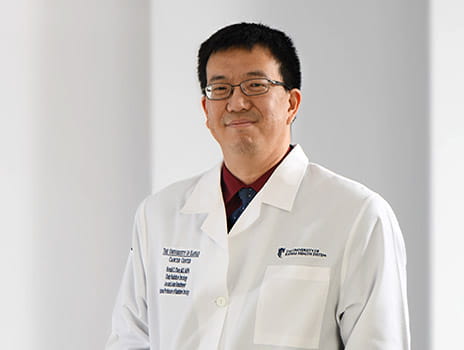- Home
- Research
- Research that Transforms
- Beyond the Bench
- Beyond the Bench 2020
- Leading the Way
Leading the Way

In 2019, Ronald Chen, MD, MPH returned to his home state and joined The University of Kansas Cancer Center as Associate Director for Health Equity. He discussed our efforts to eliminate cancer health disparities in Kansas and beyond.
Thanks to advances in science, we have made progress in cancer care and prevention by leaps and bounds. Yet not everyone has benefited equally from these gains.
A cornerstone of the cancer center’s National Cancer Institute (NCI) designation is ensuring we hone our research efforts to address the needs of those we serve. Our catchment area stretches across the entire state of Kansas and into western Missouri and is home to many communities. This includes a growing Latinx population, Black/African Americans, American Indians, immigrant communities and many individuals who live in rural areas. While diverse, there is a common thread: cancer affects all groups. Yet, some groups suffer from cancer disproportionately.
Black/African American men are 2.2 times more likely to die from prostate cancer than non-Hispanic Whites. As a genitourinary radiation oncologist, I have witnessed this disparity firsthand in my clinic. Latina women are more likely to be diagnosed with breast cancer at an advanced stage than white women. African Americans have higher death rates than all other groups for many cancer types. These are just a few examples.
Historically, such efforts to understand and improve these unequal burdens have focused solely on issues related to one’s race or ethnicity. Over the last few years, the NCI has acknowledged that rural areas also fall into the underserved category. While individuals living in rural communities are less likely to develop cancer, they are more likely to die from it compared to their urban counterparts.
The cancer center’s designation as an NCI Community Oncology Research Program (NCORP) site is one way we are attacking that rural gap. KU Cancer Center is the only institution in the country to have an NCORP designation specifically focused on rural patients. The program connects community hospitals with an infrastructure required to offer clinical trials, giving rural patients access to leading-edge treatments close to home. In our first year as an NCORP site, we exceeded clinical trial accrual goals by more than 22 percent.
Education matters
Many cancers are preventable. For some groups, methods to prevent them are either not available or not being adopted. There is an opportunity to educate people about ways they can reduce their cancer risk ― from limiting risky behaviors like smoking to maintaining a healthy weight. Education drives awareness and prevents cancer.
The cancer center’s online series, called Bench to Bedside, airs live each week on Facebook. Hosted by cancer center director Roy Jensen, MD, the series includes interviews with clinical and research professionals from the cancer center as well as our research and community partners. Anyone with an internet connection ― regardless of where they live ― can access this free resource to learn the latest information and advances in cancer care and research.
Our outreach network, the Masonic Cancer Alliance (MCA), provides free cancer screenings in communities throughout the state. We hosted a free prostate cancer screening event this year at five locations across the Kansas City metro. Each summer, MCA members arm themselves with gallons of sunscreen and lead “Pool Cool,” a program that trains community pool lifeguards and swim instructors about the importance of sun safety. These and so many more programs exist to equip people with ways to reduce their cancer risk.
Everyone, regardless of race, ethnicity or where they live, deserves the very best in cancer care. Ronald Chen, MD, MPH
Engaging our communities
We have established a robust infrastructure to consistently engage, listen and communicate with stakeholders across all our communities. This includes our Community Advisory Board, patient research advocacy (PIVOT) team, Faith Works, Juntos, All Nations Breath of Life and the KPPEPR network …the list goes on. These groups are vital in our efforts to engage diverse communities and fine-tune our efforts.
Our health equity research efforts are always evolving. Leveraging multiple sources for data, we closely monitor cancer incidence and mortality trends in our catchment area. These data are used to guide future research efforts and ensure we are not forgetting our most vulnerable populations. It’s a constant process of adapting our efforts to address the biggest needs in the catchment area.
I grew up in Kansas and after 20 years working on the East Coast, I chose to come back home. In 2021, the cancer center will be submitting its application to be considered for NCI Comprehensive designation ― the highest designation possible for a cancer center in the United States ―and I wanted to contribute to that effort.
Everyone, regardless of race, ethnicity or where they live, deserves the very best in cancer care.
Community Program Highlights
Juntos Center for Advancing Latino Health: “Decidetext” mobile smoking cessation intervention aimed at Latinxs.
Faith Works: Network of researchers, patients and faith-based organizations addressing cancer health disparities among African Americans and underserved, underinsured individuals.
All Nations Breath of Life: The first scientifically tested, culturally tailored smoking cessation program designed for American Indians.
Kansas Patients and Providers Engaged in Prevention Research (KPPEPR): Practice-based research network.